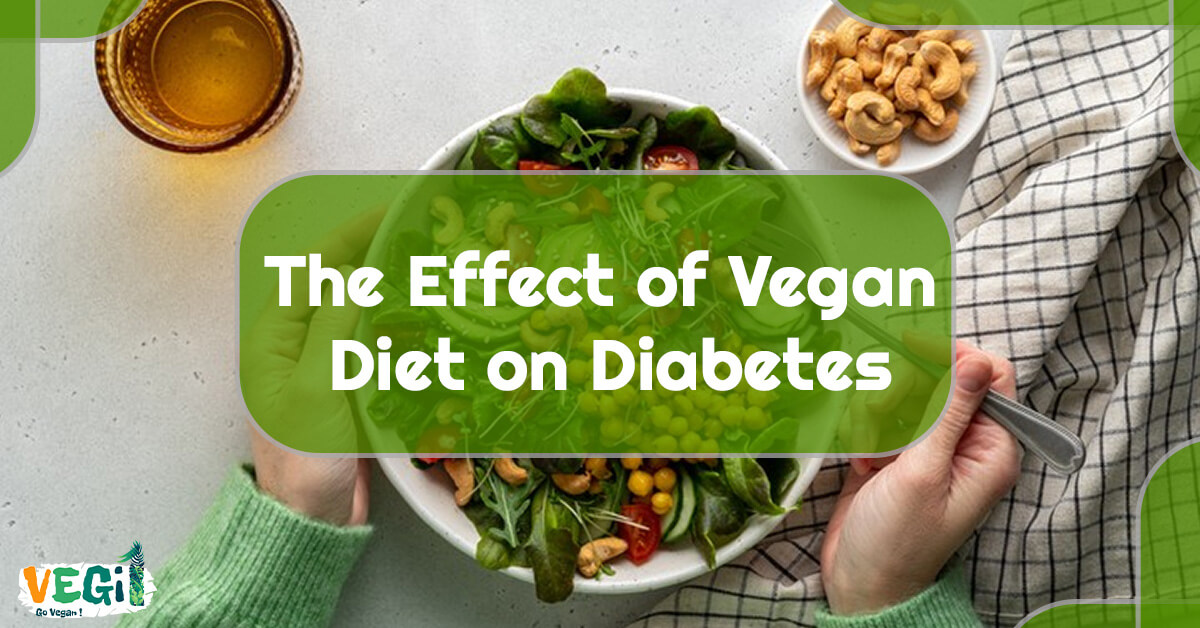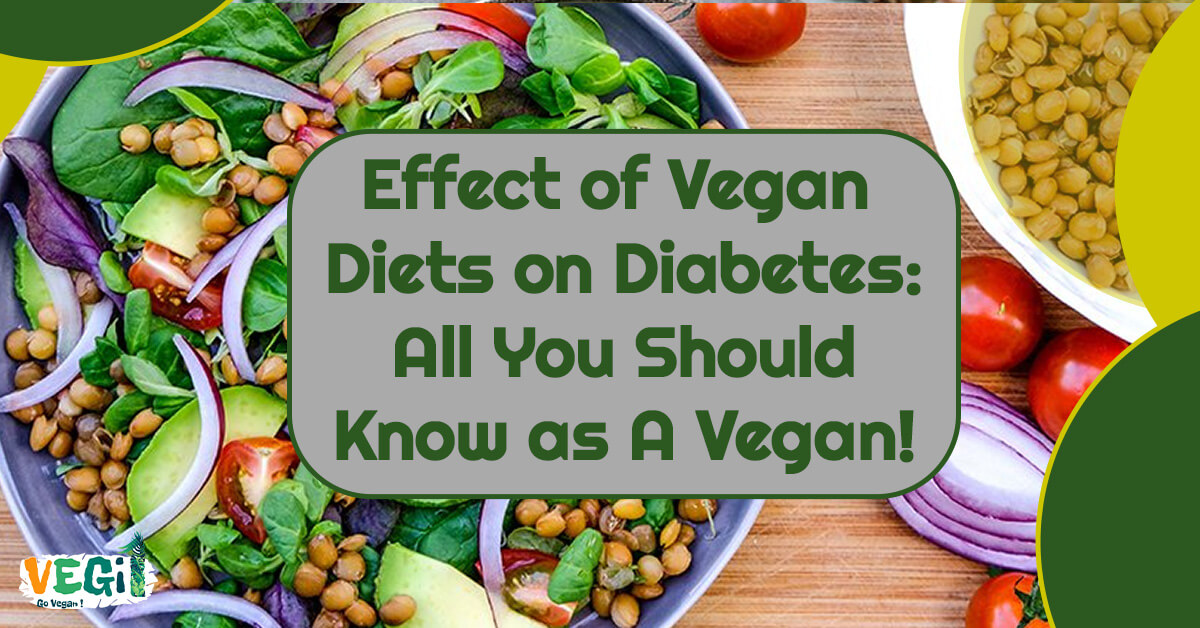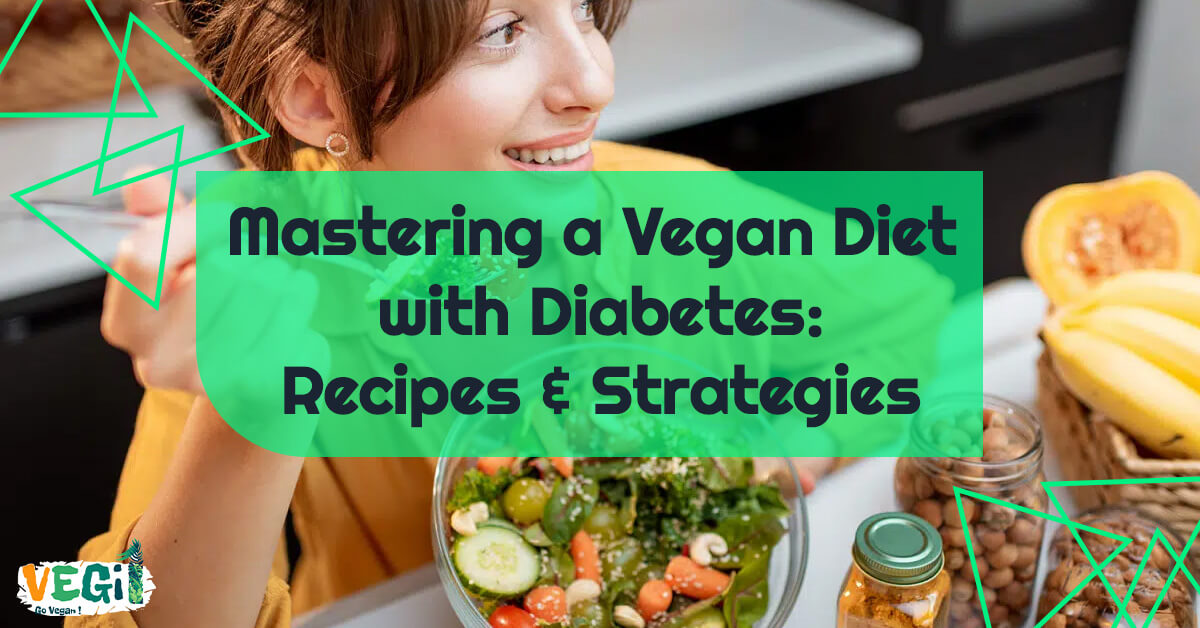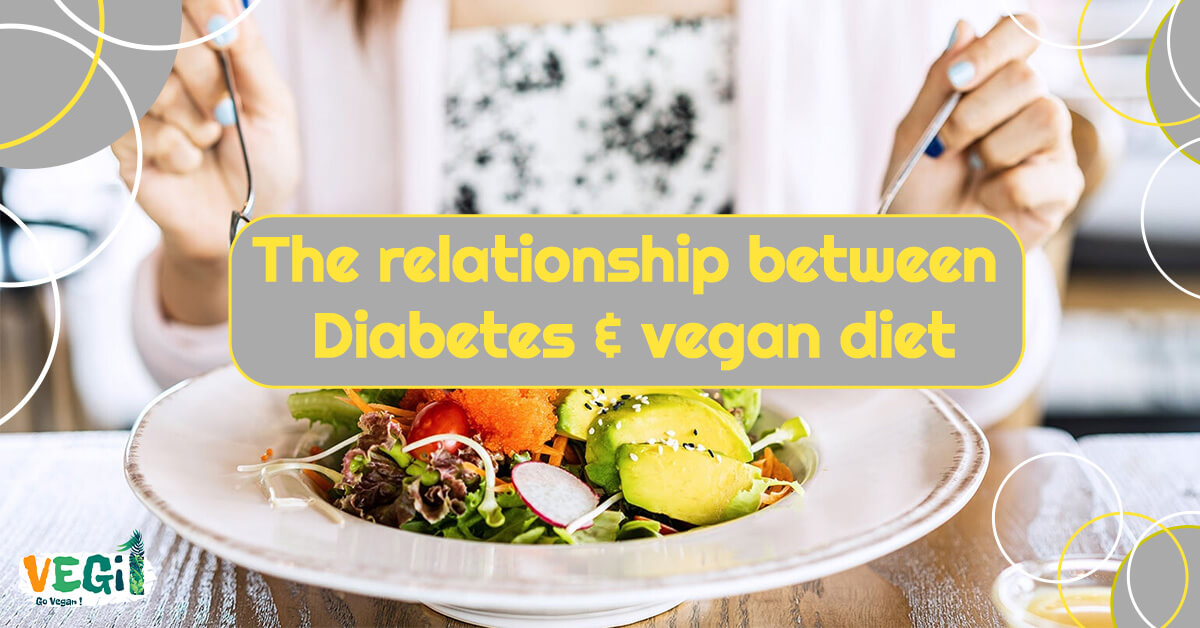The Effect of Vegan Diet on Diabetes
Unlock the power of a plant-based diet in managing diabetes and improving overall health.

Veganism refers to a vegetarian lifestyle and diet in it. This diet focused on intaking fruits, vegetables, grains, legumes, nuts, and seeds, excluding animal-based products such as meat, eggs, and more.
Since this diet is based on plant-based products, it can significantly help reduce the risk of most diseases, such as cardiovascular disease, certain malignancies, obesity, etc.
But what about Diabetes? As you may know, dietary choices play a crucial role in managing Diabetes, and according to research, a vegan diet could offer significant benefits for Diabetes.
How could a vegan diet positively affect Diabetes? If you are a diabetic person and want to know the vegan impact on Diabetes, stay with us in this article to find your answer.
In this article, I discuss everything you need to know about Diabetes & vegan diets: The Effect of Vegan Diet on Diabetes.
In this article you will read:
Mechanisms of Action of a vegan diet in the Treatment of Diabetes
The vegan diet emphasizes consuming foods derived from plants and excludes animal-based products. By following this diet and making careful preparation, you can achieve all your nutritional requirements,
People with Diabetes must put in more effort to arrange their vegan diet. Carbohydrates impact blood sugar levels more than protein and fat. Therefore, persons with Diabetes must maintain a steady intake throughout the day.
Including non-carb items in your diet can help lessen the impact of carbohydrates on your blood sugar, so it’s essential to strike a balance between carbs, protein, and healthy fat at every meal and snack.ca
This is possible with a vegan diet, although it may take some practice if you’re starting.
If you are trying to control your diabetes levels by adopting a vegan diet, here are some suggestions for carbohydrates, proteins, and fats that you may use to create healthy meals and snacks:

The whole diet that vegans should know about, especially Diabetes
- Carbohydrates include fresh, frozen fruit, quinoa, corn, rice, potatoes, oats, grits, and bread made from whole-grain flour.
- Plant-based protein sources include soy and soy products (tofu, tempeh), as andr legumes, nuts, seeds, nut butter, and animal substitutes.
- Oils and fats include olive and avocado, nuts and seeds, coconut, and vegan margarine.
Plant-based and vegan foods are the best sources of fiber, an indigestible carbohydrate present in almost all plant-based diets.
The fiber in these meals makes them more satisfying and can lessen their effect on blood sugar levels.
After all these tips and data, I explained about now here is an important question:
Can a vegan diet help people with Diabetes manage blood glucose? The answer is yes.
Managing blood glucose levels is more straightforward with a vegan diet low in cholesterol and saturated fat but high in fiber and protein.
So, follow us to continue to dive into details about veganism and Diabetes; The Effect of Vegan Diet on Diabetes.
What exactly is a vegan diet for diabetics?
As mentioned above, veganism is a diet based on plant-made products.
Whether or not you have Diabetes, if you follow a vegan diet, you should consume plant-based products instead of animal-based ones.
So, all vegans are concerned about what they should eat if they have Diabetes.
What does the diabetes people typically consume?
Those who have Diabetes should consume the right foods to reduce the risk of disease progression.
To restrict carbohydrate intake, they can focus on consuming the following food groups:
- Fruits and vegetables
- Whole grains, including brown rice and oats
- Proteins such as eggs, beans, lentils, chicken, and meat
Diabetic individuals following a vegan diet can obtain protein from sources like nuts, seeds, and lentils instead of relying on animal-based products high in fat.

Is it difficult for people with Diabetes to maintain a vegan diet?
Adhering to a vegan diet while managing Diabetes necessitates some degree of concession; however, obtaining appropriate recipes and effectively strategizing one’s dietary regimen can facilitate the seamless adoption of a vegan diet for Diabetes.
Ensuring a harmonious balance of protein, carbohydrates, fat, vitamins, and minerals is imperative when devising a vegan diet.
Compared to specific diabetes diets, vegan diets typically do not necessitate adherence to specific portions or caloric intake, rendering them comparatively more manageable.
The different types of Diabetes & veganism
In this part, there is a need to mention that Diabetes has two types:
- Diabetes Type 1
- Diabetes Type 2
Let’s see the relationship of veganism with these two types of Diabetes:
1. Type 1 Diabetes & Veganism
Although a vegan diet positively affects diabetes management, it is not a guaranteed cure.
Weight loss has the potential to reduce an individual’s glucose levels. This can alter the required dosage of insulin in type 1 diabetes.
They can ensure that the appropriate dosage of medication is being administered.
If you have type 1 or 2 diabetes, you can safely follow a balanced vegan diet. However, a vegan diet can still obtain everything your body requires.
The Role of Raw Vegan Foods in Improving Insulin Sensitivity & Blood Sugar Control
2. Type 2 Diabetes & Veganism
Type 2 diabetes is significantly associated with obesity and dietary habits, particularly in an aging population, leading to a more sedentary lifestyle.
Type 2 diabetes can be prevented, arrested, and occasionally reversed through dietary interventions.
Specific dietary patterns, such as those that are plant-based, have been found to provide notable benefits in managing type 2 diabetes.
Research conducted as early as 1994 has indicated that adopting a diet devoid of animal products can significantly enhance triglyceride, total cholesterol, and fasting blood glucose levels.
In certain instances, this dietary shift has even obviated the necessity for glucose-lowering medications.
So, it results that the vegan diet can help Diabetes in both diabetes type 1 and 2.

How does the vegan diet help Diabetes?
Vegan diets are characterized by a low-fat content, which allows the body’s cells responsible for storing surplus glucose to operate optimally and maintain elevated insulin sensitivity.
Individuals with a normally operating pancreas experience insulin secretion upon consumption of any substance that can elevate blood glucose levels. Insulin facilitates the glucose uptake-ells from the bloodstream, utilizing it as an energy source or storage for future use while concurrently reducing blood glucose levels.
Prolonged exposure to elevated blood glucose levels can result in adverse effects on various bodily systems, including but not limited to the vascular, ocular, neural, and renal systems. Vegan alternatives are comparatively lower in fat content than meat and animal products. Consuming high amounts of fatty foods may lead to a reduction in insulin sensitivity.
One of the benefits of a vegan diet is its high fiber content which can reduce the absorption of sugars into the bloodstream and prevent blood glucose level spikes.
People who have type 2 diabetes sometimes suffer from Neuropathy pain. Following a vegan diet rich in fiber and low in fat can reduce the likelihood of experiencing pain.
Additionally, a vegan diet can be helpful for weight management for type 2 diabetes since this diet is lower in calories than the usual diet. This can help individuals lose weight, which can boost the insulin sensitivity.
Furthermore, a vegan diet can lower the risk of heart disease, which is particularly important for people with Diabetes as they are at a higher risk of such conditions.
By helping to control blood sugar levels, blood pressure, and cholesterol levels, a vegan diet can reduce the risk of common diabetes complications such as heart disease, kidney disease, nerve damage, and eye problems.
Some research suggests that following a vegan diet can promote a healthy gut bacterium, which is beneficial for managing Diabetes.
Diabetes Type 1 & vegan diet
Your pancreas cannot produce insulin if you have type 1 diabetes, a chronic (lifelong) autoimmune condition.
Insulin is a crucial endocrine hormone pivotal in regulating blood glucose levels.
Typically, insulin operates through a series of sequential steps:
- The human body metabolizes ingested food into glucose, a type of sugar that is the primary energy source for bodily functions.
- The entry of glucose into the bloodstream triggers insulin release by the pancreas.
- The hormone insulin facilitates the transportation of glucose in the bloodstream to the cells of the liver, adipose tissue, and skeletal muscles, enabling its utilization as a source of energy or storage for future metabolic demands.
- Upon the entry of glucose into the cells and subsequent reduction of its concentration in the bloodstream, the pancreas is stimulated to discontinue insulin secretion.
Not having enough insulin causes hyperglycemia (high blood sugar), preventing the body from converting the calories from meals into usable energy.
If left untreated, this might cause significant health issues or even death. Synthetic insulin is a daily need for those with Type 1 diabetes.
Diabetes type 1 was once referred to as insulin-dependent Diabetes and juvenile Diabetes.
People with type 1 diabetes can see improvements in insulin sensitivity and other health indicators by switching to a vegan diet high in whole carbs, according to two case studies published in the Journal of Diabetes & Metabolism by researchers from the Physicians Committee for Responsible Medicine.
In all studies, people with type 1 diabetes were tracked while they ate a vegan diet high in whole carbs, such as fruits, vegetables, whole grains, and legumes.
The patients’ healthcare teams monitored their blood sugar regulation, risk factors for heart disease, and other health indicators before and after the dietary modification.
Diabetes Type 2 & vegan diet
Individuals with type 2 diabetes experience insulin resistance, whereby the cells in the body become unresponsive to the effects of insulin, irrespective of the pancreas’ continued production of insulin.
Consequently, the body’s capacity to facilitate the transportation of glucose from the bloodstream is compromised, leading to the accumulation of surplus glucose in the blood.
Furthermore, the pancreas can exhibit inadequate insulin production in response to the body’s demands, resulting in insulin deficiency.
The coexistence of insulin resistance and insulin deficiency culminates in hyperglycemia among individuals diagnosed with type 2 diabetes.
Individuals who adhere to vegan diets that prioritize consuming fruits, vegetables, and legumes while refraining from consuming animal-derived products frequently exhibit decreased body mass, heightened insulin sensitivity, and diminished susceptibility to Diabetes.
Meat consumption has been linked to an increased susceptibility to type 2 diabetes. In contrast, including a greater quantity of fruits and vegetables in one’s diet, called veganism, has been associated with a reduced risk of developing the disease by 25-49%.

The relationship between Diabetes & vegan diet
Suppose one is contemplating adopting a vegan diet. In that case, whether for health, lifestyle, or other motivations, ensuring that such a dietary choice is nutritionally sound and well-rounded is feasible.
In addition to presenting several potential health advantages, particularly for individuals diagnosed with Diabetes, a vegan diet is noteworthy that initiating the process has become increasingly convenient.
Vegan Diet for People Who Have Diabetes
Is all vegan diet healthy for diabetic people?
If you are a diabetic person and want to follow a vegan diet, you should consider that some ultra-processed choices like chips and white bread cannot be good options for diabetic people despite being in a vegan cluster.
These kinds of foods can lead to type 2 diabetes.
To make the most of your vegan diet while you have Diabetes, you should consider a low-processed vegan diet such as:
- Fruits
- Vegetables
- Brown rice
- Leafy greens
- Seeds (flax, chia, hemp)
- Legumes (beans, peas, chickpeas, lentils)
- Whole-grain bread
- Oats
- Nuts
- tofu and tempeh
- Nondairy milk and low-sugar cereals
By following these, you can ensure you follow both vegan and diabetic diets.
The Role of Raw Vegan Foods in Improving Insulin Sensitivity & Blood Sugar Control
What are Veggie dishes helping diabetes treatment?
Here are some vegan dishes that can be beneficial for managing Diabetes:
- Andean-style quinoa
- Carrot and cumin salad
- Apple strudel
- Saag aloo
- Tofu goujons
- Coconut rice pudding
- Channa dahl
- Gado Gado
- Vegetable tagine
- Layered potatoes
- Wild mushroom risotto
- Muesli energy bars
- Mulligatawny soup
- Apricot porridge
- Tomato and olive salad
Conclusion: are you ready to engage in the activity?
Diabetic people need to choose the right foods for their meals to reduce the risk of disease progression since Diabetes is a chronic condition that requires ongoing management and medical treatment.
Following a vegan lifestyle can aid in the management of Diabetes and reduce the occurrence of complex symptoms.
When you want to follow a vegan diet, choose low-processed food and eliminate options such as chips and highly processed snacks.
Following a dietary regimen, it is advisable to consider obtaining an annual blood analysis.
Medical professionals can assess an individual’s B12, iron, vitamin D, and calcium levels to ascertain their dietary intake adequacy.
If you need help, they can assist you in locating vitamins or alternative methods to compensate for the deficiency.
Now it is your turn to talk about veganism and Diabetes; The Effect of Vegan Diet on Diabetes if you have experiences and ideas.










